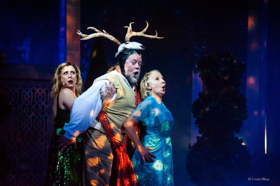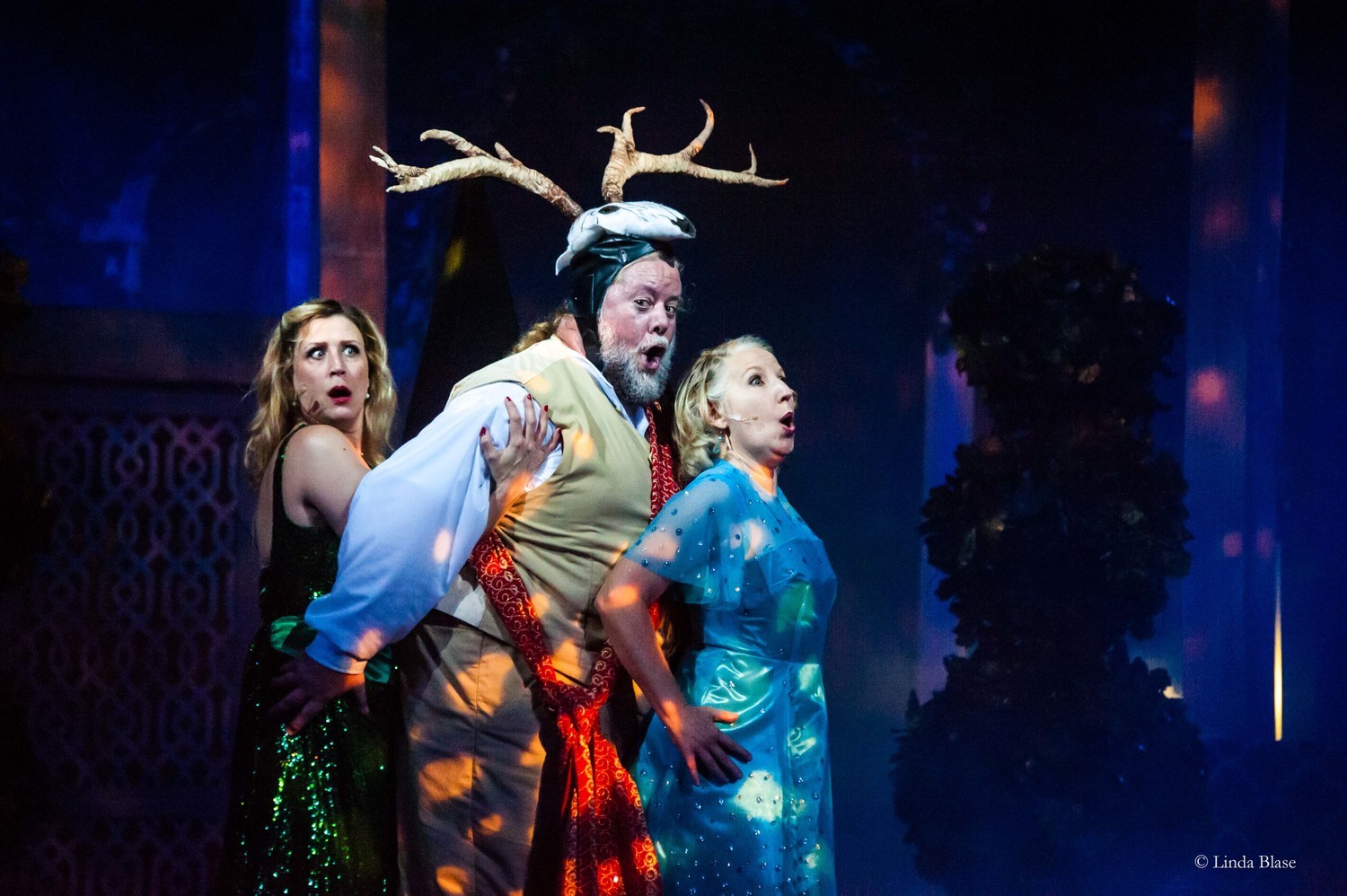A How-To Guide For the Adventurous Actor Pt. I: Outdoor Theater


If you're a young actor entering a new market like me, I've got good news and bad. The good news is your early career will probably not be clear-cut and straight-forward like you imagined, which means you get to break out of your shell and see theater from a brand new perspective. The bad news is you'll face entirely new challenges for which you might not feel prepared. You'll likely be acting in repurposed or outdoor spaces, with potentially as little as a few days worth of rehearsal. You may not be able to lean on the usual staging or costuming conventions. You'll feel engaged and excited, sure, but maybe not quite so at home.
Less than a year out of school, I've already had several "outside-the-box" acting opportunities thrown my way, starting with my first outdoor show. I spent my summer with Shakespeare Dallas, playing Anne Page in their production of The Merry Wives of Windsor. Shakespeare Dallas has been producing outdoor theater for a while, so they know how to take care of their actors, but not even the magic of Shakespeare could eliminate Dallas's powerful heat in July. We rehearsed the show indoors to start, but as tech approached and we knew we would be heading outdoors, we were given warnings and talks about how to handle the heat. The shows usually didn't start until the sun was going down, but during tech we started much earlier, often three or more hours before sunset. There were water coolers and red plastic cups provided for us backstage, extra sunscreen lying around, and fans running constantly. As in an office, the water cooler quickly became the favorite place to hang out backstage. But if your character isn't onstage much, be kind and make room for Falstaff to grab a drink in between scenes. You're also not right next to the costume shop or scene shop if you're in a remote location, so be patient. Making changes to a set piece or substituting a different prop may take longer than usual.
One issue I did not foresee was the classic sweating in makeup problem magnified tenfold by the humid atmosphere and direct exposure to sunlight. My face was a puddle of melted makeup and sweat, not to mention clogged pores and breakouts. Don't wear makeup until dress rehearsal, if at all possible. Why sweat in makeup during tech if you don't have to? Your skin will thank you later on down the line. Men and women both, choose your makeup wisely. You don't want your best and most expensive makeup to go to waste. Remember, if it can melt on your face it can melt in the compact. Remove makeup immediately after the show, and wash your face with some nice cool water. Wear sunscreen under your makeup to start the show - you likely will not need to reapply since the sun will be going down, but that first hour or so is enough to burn you. Along with the heat also come the bugs, so make sure to apply a generous amount of bug spray everyday too. If you have people coming to see the show, make sure to warn them about the bugs too. The audience gets bitten just as much as the actors.
Some outdoor theaters will perform in the spring or fall, so you might also need to prepare for cold weather. Weirdly enough, most of the same guidelines apply - continue to hydrate, wear sunscreen, and try to take care of your skin. The only difference is instead of bringing a hat or fan, you might need to bring a blanket or coat to throw on when you are offstage. If it is sprinkling, you will likely keep going, so bring a raincoat and be prepared to tough it out. Don't bring an umbrella though - it could act as a lightning rod. Also, be prepared for strong wind onstage. Wear shorts under dresses and pin hats securely in place.
Weather makeup days are days you are contracted to be available even though you will likely not go on. This may be done so you are guaranteed a certain number of tech rehearsals, or so that patrons are guaranteed a certain number of shows. Do not schedule plans at those times! We were plagued by rain during tech this summer and ended up using both weather makeup days. I had thought about scheduling auditions or appointments on those days, but I'm glad I didn't. Leave them open. Worst case, you've scheduled yourself mandatory time off, which is nice to do for yourself anyway.
Though there are some challenges related to weather, it can also be a useful addition to the story being told onstage. I once attended an outdoor production of King Lear on a grey day that threatened rain. The rain held off just until the big storm in Act 3, Scene 2, but as Lear shouted at the heavens "Rumble thy bellyful! Spit, fire! Spout, rain!," the thunder obliged. It began to rain, and the rain grew in intensity as the scene did, until we were forced to abandon Lear outside and run into a nearby garage. It was a marvelous effect that could never have been achieved indoors, and a reminder that sometimes nature cooperates in the making of art. The weather and the environment can become another character in the play if you let them. The weather is an element of change that will always keep you on your toes as an actor.
Sets for outdoor theaters are usually constructed a little differently from those indoors. The ground underneath the stage may be irregular, and the stage itself may be an uneven or slippery surface. Even if there is no rain at the time of the show, it may have rained earlier in the day, so the stage may still be wet by show time. Though designers try their best to construct non-slippery surfaces, any material has the potential to be slick when wet. Ask if you can walk the stage in your show shoes before you begin tech to identify any uneven or potentially slick portions of the stage, especially if there is dancing or fight choreography in the show. For example, in The Merry Wives of Windsor, my heels were always getting wedged in between the boards on the stage, and sometimes it would cause me to stumble. I quickly developed a character that walked on her toes, especially on stairs, to avoid this. Unfortunately though, I made the mistake of traipsing around in my cute little show heels for the two and a half hour long show every night, while I should have taken a page out of actress Connie Gold's book and worn my own comfortable shoes until the last possible moment. Closed-toe is a must, as there are often ants, gravel, and fallen twigs, which could hurt a person's exposed feet. Our set was constructed entirely of old gnarled wooden planks that could get pretty splintery, so nice thick soles on the shoes were a good idea too.
Backstage may not be exactly what you'd expect either. Shakespeare Dallas has an underground bunker that houses their dressing rooms and greenroom. Other outdoor theaters may house dressing rooms in trailers. Backstage may be a very small area reserved only for those about to make an entrance. Your stage management crew will let you know where the designated greenroom/common area is. If you're worried about getting in the way, I'd suggest hanging out in your dressing room when possible. You may be spending time a lot of time in a basement or trailer, but at least you'll be able to keep cool!
An outdoor space has drastically different acoustics than a controlled indoor environment. Outside, there are far fewer surfaces for the voice to bounce off. Our audience sat on grass-covered ground, and there were no walls except a partial wooden one upstage. Some outdoor theaters are more like concrete amphitheater structures, and in these theaters actors may not be mic'd, but at Shakespeare Dallas it is necessary to mic them. Be very very careful with your microphone! It is both valuable to the company and necessary for you to do a good job. Drink your water through a straw to avoid splashing on a body mic. If your microphone goes out onstage, buddy up - find the nearest person and stand very close so that their mic will pick up your voice. At Shakespeare Dallas, if all else fails and a person cannot be heard onstage, someone will bring out a handheld microphone. It is simply impossible to do the show without some form of amplification.
Having everyone mic'd means that every voice comes out of the same speakers, so it can be hard for the audience to tell who's talking. A pro tip I picked up from Shakespeare Dallas veteran T.A. Taylor: when you're speaking, try to make a large enough gesture or movement to draw people's eye to you. Since the audience can't always tell whose voice is whose without some help, your body language and physical relationship to others must become an even bigger part of the storytelling. Shakespeare Dallas's stage is also very wide and expansive, as many outdoor stages are. It can be hard if you're all the way stage left to be seen by the audience members sitting stage right, but don't forget about them for an entire scene! Try to play to as much of the audience as you can. Remember if you are backstage, there is not a wall or curtains to block you - you must stay in the designated areas or you will distract from what's happening onstage. There is already enough potential for distraction with sirens, airplanes, cars driving past, animals, and weather phenomenon.
Even the audience can be a distraction of its own. Often families will bring picnics. People may be talking, opening bottles, or eating during the show. At Shakespeare Dallas, they have at least one day of each production when patrons can bring their dogs to the show. This laid-back atmosphere is not an insult to the actors or the production staff! You can even enjoy what it does for you to have an audience let their guards down like that. The more public, interactive feeling of these shows draws people in in a different way than usual - it literally breaks down walls between the public experience and the theatrical experience. You can look your audience in the eye and directly address them, especially at the beginning of the show when it's still light out. Plus, it's likely these patrons aren't your typical theatergoers, so you may be reaching people who wouldn't otherwise attend any theater. Seeing families, friends, and couples make an event out of a night at the theater warms my heart.
Young actors often have to take any job they can get, no matter how challenging or unusual. If you treat these odd jobs as learning opportunities, you will eventually recognize the unique value of each one. Performing in the park reminded me first and foremost to be an attentive actor. I was more attentive to my scene partners because we both had to roll with the punches. I became more attentive to the audience because I could so easily monitor their focus and enjoyment. I was less afraid of making large, specific choices and of breaking down the fourth wall because it served the story. It turns out that outdoor theater, though challenging, can be a truly joyful growth opportunity.
Comments
Videos

